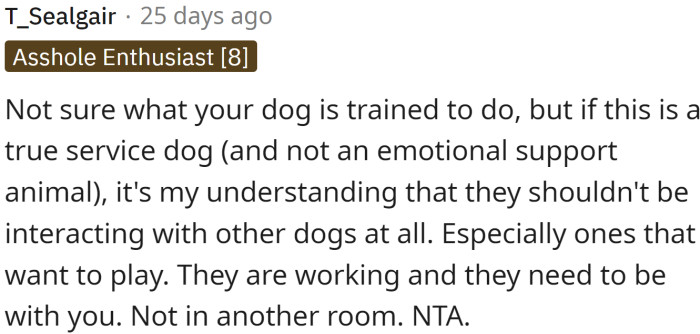Woman Faces Conflict Over Her Service Dog At Family Lunch
OP is a 26-year-old woman who struggles to find her place in the family dynamic. She has a brother who is only one year younger than she is, and they are both on the autism spectrum.
Despite her own struggles, OP has worked hard to receive support and is currently employed full-time, while her brother only works part-time and does not receive help. OP's medical team suggested obtaining a service dog, and she received a puppy who would eventually become her aid.
On Christmas Day, OP's brother wanted to bring his one-year-old bulldog to lunch, and OP asked him to get a pen for his dog. However, her brother preferred to tie his dog up, and they compromised.
During lunch, OP's puppy became overstimulated from playing with her brother's dog and was put away for a nap. Unfortunately, other family members took the puppy out again, and her brother's dog was all over her.
OP's brother became angry when she asked him to tie his dog down for a while, and he eventually left after swearing and yelling at her and her partner. Later, OP's mother said they were both responsible for the situation, and OP questioned whether she should have done something differently.
She asked if she was in the wrong for asking her brother to keep his dog on a lead, but her mother suggested that she should have been more explicit about her boundaries with the puppy. Despite feeling overwhelmed, OP did not receive the support she needed from her family during the conflict.
OP asks:

She struggles to find her place in the family dynamic.

She has a brother who is only one year younger than her, and they are both on the autism spectrum.

The Intersection of Disability and Family Dynamics
The conflict surrounding the service dog at family gatherings highlights the complexities faced by individuals with disabilities.
According to research in the field of disability studies, service animals play a crucial role in enhancing the quality of life for individuals with disabilities, providing not just physical assistance but also emotional support.
This dual role can sometimes lead to misunderstandings among family members who may not fully grasp the importance of the service animal.
Despite her own struggles, OP has worked hard to receive support and is currently employed full-time, while her brother only works part-time and does not receive help. OP's medical team suggested obtaining a service dog, and she received a puppy who would eventually become her aid.

Doctors suggested that OP a service dog would be helpful

On Christmas Day, OP's brother wanted to bring his one-year-old bulldog to lunch, and OP asked him to get a pen for his dog. However, her brother preferred to tie his dog up, and they compromised.

Research indicates that the presence of service animals can significantly reduce anxiety and enhance emotional well-being for their handlers. According to Dr. William Doherty, PhD, a family therapist, "Service animals provide not just companionship but also a sense of security that can be vital for emotional stability." For families, recognizing the importance of a service dog goes beyond mere acceptance; it involves understanding the emotional and psychological stakes involved. Encouraging family discussions about the role of service animals can foster empathy and alleviate tension, as noted by Dr. Janet Lansbury, a parenting expert who emphasizes the need for open communication in family dynamics.
OP continues:

Everyone acted as if nothing happened

OP shared some details

Family Support and Acceptance
Acceptance from family members is essential for individuals with disabilities to feel validated and supported.
Research in social psychology emphasizes that social support plays a vital role in the mental health of individuals with disabilities.
Without understanding from family members, individuals may feel isolated or invalidated, impacting their overall well-being.
OP has offered the following explanation for why they think they might be the a-hole:

Service dogs need to be with their owners, and not in the other room

This is true

A clinical psychologist would suggest that open communication channels are crucial in addressing conflicts related to service animals.
Establishing a family meeting where everyone can express their feelings and perspectives can lead to greater understanding and acceptance.
Research shows that fostering such environments promotes emotional intelligence and relationship satisfaction.
Service dogs are dogs, and they need time to rest and play

It is clear who is the A-hole here

OP needs to set boundaries now

Strategies for Enhancing Family Understanding
To cultivate a supportive family environment, it’s important to educate family members about the role and benefits of service animals.
Providing resources or inviting experts to share information can demystify the role of service dogs and foster empathy.
Research indicates that increased knowledge leads to greater acceptance and support among family members.
The story of OP and her brother highlights the challenges that come with family dynamics, especially when both siblings have different needs due to disabilities. It's clear that OP loves her brother and wants to support him, but she also has her own needs that must be met.
The incident on Christmas Day demonstrates the importance of clear communication and boundary-setting, especially when it comes to the care of service animals. While it's understandable that OP's mother may have wanted to diffuse the situation, it's also essential to recognize and validate OP's needs and feelings.
Ultimately, families must work together to find ways to support each other, even when those needs may differ. Hopefully, this experience can lead to more open and honest communication between OP and her family members and a better understanding of the importance of respecting each other's boundaries.
Additionally, creating opportunities for family members to interact with the service dog can help reduce misconceptions and foster connections.
Engaging in activities that include the service dog can help family members appreciate their role and importance.
Ultimately, nurturing understanding and empathy can lead to healthier family dynamics.
Psychological Analysis
This situation highlights the challenges individuals with disabilities face in seeking acceptance from their families.
When family members do not fully understand the role of service animals, it can lead to feelings of isolation and frustration for the individual. Encouraging open discussion and education can help bridge this gap and promote a more inclusive atmosphere.
Analysis generated by AI
Analysis & Alternative Approaches
In summary, the presence of a service dog in family dynamics requires understanding and open communication.
By educating family members about the emotional and psychological importance of service animals, families can create a more supportive environment.
Fostering empathy and acceptance can significantly enhance relationships and the well-being of individuals with disabilities.



